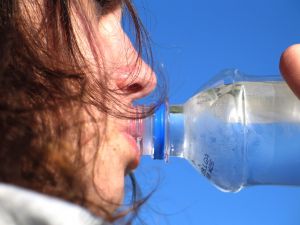Discontinuing dehydration: Definitions, signs and ways to prevent water loss
Even though it’s the middle of fall and heading into winter, dehydration might still pose a threat on those sporadic, heat-filled days. Here are a few types of dehydration and how they can be prevented.

While there are many brands of bottled water to choose from, each one has something ‘extra something’ which makes each one unique.
November 12, 2008
Even though it’s the middle of fall and heading into winter, dehydration might still pose a threat on those sporadic, heat-filled days. Here are a few types of dehydration and how they can be prevented.
WHAT IS DEHYDRATION?
• Dehydration is when the amount of water leaving the body exceeds the amount entering it.
• Water constitutes 75 percent of the body’s water weight.
• The body loses water when it sweats, breathes, urinates or when humidified air evaporates.
WHAT ARE SOME SIGNS OF DEHYDRATION?
The first two signs are immediate responses of the body; the following signs might occur if the level of water loss continues to increase.
• Thirst
• Decreased urine output to conserve water in the body
• Dry mouth
• Muscle cramps
• Sweating cessation
• Eyes stop making tears
• Nausea or vomiting
• Lightheadedness
HOW CAN DEHYDRATION BE PREVENTED?
According to the Web site, prevention is the first step in treating dehydration.
• Exercise: People exercising in a hot environment or for a long period of time need to drink adequate amounts of water. Studies show that the normal human body needs eight glasses of water to be hydrated; when you exercise rigorously, you need more than eight glasses.
• Environment: Dehydration due to changes in the weather can be prevented. If you get easily dehydrated, try not to schedule outdoor activities during the hottest times of the day (11:00 a.m. to 2:00 p.m.), or, if you do, be sure to drink an adequate amount of fluids before and after your activities.
For more information on dehydration, visit the MedicineNet Web site at: http://www.medicinenet.com/dehydration/article.htm.






